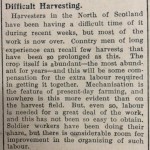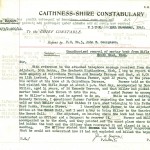On 11 November the Germans made one last attempt to break through the Soviet defences at Stalingrad; for two days it looked as if they might finally drive the Soviets back across the River Volga, but eventually this attack stalled like all the others. Also this week the American and Japanese fleets met at Guadalcanal in the Pacific: several American ships were sunk but the US Navy still retained control of the sea. In the Western Desert Allied forces pursued the Germans retreating from El Alamein: on 12 November Tobruk was recaptured. Meanwhile, US forces fought the Vichy French to capture Oran in Algeria, sinking 17 French ships.

On 9 November Thurso Burgh Council agreed the following motion: “On the motion of Provost Brims it was agreed to send a letter of congratulations to the Officer Commanding the 51st Division, on their recent success in the Battle of Egypt”. (It is interesting to note that the “battle of Egypt” had not yet been designated as the battle of El Alamein.) The commanding officer was in fact Major-General Douglas Wimberley, and the division included the 2nd and 5th Battalions of the Seaforth Highlanders.

As a result of the victory the John O’Groat Journal reported, “Church bells are to be rung on Sunday forenoon throughout Britain and the Dominions in celebration of the victory in Egypt.” This would be the first time the bells had rung out since May 1940, and the advance notice was necessary because church bells were normally only to be rung in the event of a German invasion.
 Meanwhile the John O’Groat Journal commented on the delay to the harvest caused by unusually wet weather: “Harvesters in the North of Scotland have been having a difficult time of it during recent weeks, but most of the work is now over. Country men of long experience can recall few harvests that have been so prolonged as this.” Although the crop itself was abundant, and soldiers had been employed in bringing in the harvest, “labour is needed for a great deal of the work, and this has not been so easy to obtain.”
Meanwhile the John O’Groat Journal commented on the delay to the harvest caused by unusually wet weather: “Harvesters in the North of Scotland have been having a difficult time of it during recent weeks, but most of the work is now over. Country men of long experience can recall few harvests that have been so prolonged as this.” Although the crop itself was abundant, and soldiers had been employed in bringing in the harvest, “labour is needed for a great deal of the work, and this has not been so easy to obtain.”
Of course, one way the farmers of Caithness were able to bring in the harvest was by taking their children out of school to help, often to the frustration of teachers. Bower School log book records tersely on 9 November: “Attendance irregular, partly due to children being employed in potato-lifting”.
November: “Attendance irregular, partly due to children being employed in potato-lifting”.
 Finally this week, two Wick boys (Thomas Farmer, aged 12 and Donald Miller, aged 14) found themselves in trouble with the police for removing a mortar bomb from the Rifle Range at South Head. At first Farmer stuck to the story that “Miller had picked up the mortar bomb and had thrown it into the sea”; but on being questioned further he admitted that he and Miller had stolen it and “hidden it in a shed belonging to his father at East Banks, Francis Street.” Taken to the shed, the boys “pointed out the exact place where they had hidden the bomb”, from where it was recovered in a sandbag. “The Officer stated that the bomb was very dangerous and that he could not understand how it had not exploded and killed the boys”.
Finally this week, two Wick boys (Thomas Farmer, aged 12 and Donald Miller, aged 14) found themselves in trouble with the police for removing a mortar bomb from the Rifle Range at South Head. At first Farmer stuck to the story that “Miller had picked up the mortar bomb and had thrown it into the sea”; but on being questioned further he admitted that he and Miller had stolen it and “hidden it in a shed belonging to his father at East Banks, Francis Street.” Taken to the shed, the boys “pointed out the exact place where they had hidden the bomb”, from where it was recovered in a sandbag. “The Officer stated that the bomb was very dangerous and that he could not understand how it had not exploded and killed the boys”.
